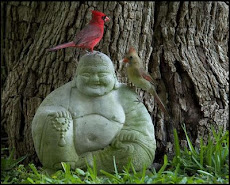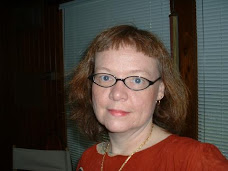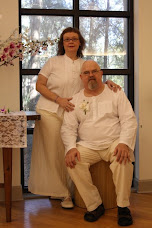I was born to parents who could not love me. My mother died when I was only four years old. My father, a over-educated intellectual with a lot of pizazz and borderline personality disorder, possessed many talents. He smoked a pipe and wore a tiger eye ring. He excelled at watercolor painting and playing the quitar. He had a "green thumb" and was an avid vegetable gardener. My dad enjoyed reading Chaucer, Shakespeare, and Mark Twain. He wove macrame plant hangers and liked to fly a kite at the beach. One talent he lacked was the ability to be the caring and consistent type of parent that a daughter needs.
I've been told that my dad was different as a young man, perhaps before the stresses and strains of married life and earning a living overtook his life. He became an Eagle Scout in high school. He sang duets in the Disciples of Christ church back home in Kentucky with my aunt Leafie, his brother Joe's wife. When he and his brother Jim were undergraduates at Sue Bennett College, my dad was a cheerleader and Jim played on the basketball team. All of this happened before I was born. I'm not sure exactly when he changed from being a person who was fairly normal and engaged with life into the eccentric, detached, and isolated individual that he was throughout my childhood.
I became somewhat like the concept of a Lost Child, as defined by therapist and author Sharon Wegscheider-Cruse. The lost child is often quiet, withdrawn, and aloof. Because lost children are so often overlooked, they tend to feel lonely, depressed, and rejected. They frequently have difficulty connecting with others and prefer to be alone. The lost child may be perceived by others as being unsociable. Because they try so hard to stay invisible, they are often overlooked by people who might be able to help them.
The Lost Child role is characterized by shyness, solitariness, and isolation. Inwardly, he or she feels like an outsider in the family, ignored by parents and siblings, and feels lonely. The lost child seeks the privacy of his or her own company to be away from the family chaos, and may have a rich fantasy life, into which he or she withdraws. The lost child often has poor communication skills, difficulties with intimacy and in forming relationships, and may have confusion or conflicts about his or her sexual identity and functioning. Lost children may attempt to self-nurture by overeating or using drugs or alcohol.
Wegscheider-Cruse writes that the solitude of a Lost Child may be conducive to the development of his or her spirituality. This certainly rings true for me. This afternoon finds me perched on a little wooden meditation bench with a small circle of people in a Zen Buddhist sangha. Today is Valentines Day. Part of this afternoon's meditation involves savoring the sweetness of chocolate. We share Hershey's Kisses and Ghiradelli Squares.
It is a balmy Florida pre-Spring afternoon. Our sangha meets in a classroom at the Unitarian Universalist Church. We have the classroom door and windows open during our meeting in order to enjoy the nice weather, and we can hear the soothing sound of a bubbling fountain in the church courtyard. We also hear a barred owl hooting softly in a wooded area. White dogwood and redbud trees near the church are beginning to blossom.
During meditation, my thoughts drift to the past and my family of origin. I am the only surviving member of my nuclear family. Both of my parents and my sister are gone now. As I meditate, tender feelings for them arise and make me smile. All of the hurts and disappointments of the past are gone. I am still here, living on earth in a human form, and I carry my family with me in my heart.
The Lost Child may develop a rich inner life and creative mental pursuits, if self-esteem issues do not shut down all efforts at achievement. The lost child commonly has few friendships, and may have difficulty finding a marriage partner. Instead, he or she might try to find comfort in material possessions or pets. This pattern of escape may allow him or her to avoid seeking professional help, and remain stuck in social isolation.
I found Jack through my spiritual community. We met at our church in 2003 and were married last year, right before Valentines Day. We have just celebrated our first anniversary. It is a very special time for us. Being with this sangha makes it seem even more special, since our wedding ceremony was in the Buddhist tradition, complete with lotus blossoms adorning our wedding cakes and the Heart Sutra chant sung by our friends.
Our sangha goes on a walking meditation through the Memory Garden behind our church. As we walk contemplatively along the brick path, I gaze at the lovely camelias blooming all around the garden. Camelias have been planted in memory of church members who have died. I read the names posted on plaques next to each camelia plant. I remember many of these people who were fellow members of my spiritual community. They lived their lives and now they are gone.
I am still here. Thoughts flow through my mind as I meditate. Someday I too will be gone. How would I like to use the remainder of the time that I have left here on earth? What would I like to accomplish and what would I like my legacy to the world to be? How do I want to be remembered? What can a Lost Child do to make the world a better place?
I have no ready answer for those questions. I believe that the answers will come to me through continued meditation and spiritual practice. I am 50 years old and still dreaming of the future that I want to create. Maybe eating chocolate will help!
Saturday, February 14, 2009
Subscribe to:
Comments (Atom)














.jpg)


































